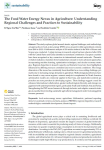Mai E.N., Inoue N., Uenishi Y. (2025). The food water energy nexus in agriculture: understanding regional challenges and practices to sustainability. Sustainability, 02/05/2025, vol. 17, n. 10, p. 4428.
https://doi.org/10.3390/su17104428
https://doi.org/10.3390/su17104428
| Titre : | The food water energy nexus in agriculture: understanding regional challenges and practices to sustainability (2025) |
| Auteurs : | E.N. Mai ; N. Inoue ; Y. Uenishi |
| Type de document : | Article |
| Dans : | Sustainability (vol. 17, n. 10, May 2025) |
| Article en page(s) : | p. 4428 |
| Langues : | Anglais |
| Langues du résumé : | Anglais |
| Catégories : |
Catégories principales 07 - ENVIRONNEMENT ; 7.4 - Ressources Naturelles : Paysage, Biodiversité, Patrimoine naturelThésaurus IAMM RESSOURCE EN EAU ; RESSOURCE ENERGETIQUE ; RESSOURCE ALIMENTAIRE ; AGRICULTURE ; GESTION DES RESSOURCES ; DURABILITE |
| Résumé : | This study explores global research trends, regional challenges, and methodological approaches in food-water-energy (FWE) nexus research within agricultural contexts from 2000 to 2024. A bibliometric analysis of 929 articles indexed in the Web of Science and Scopus was conducted. A sharp increase in research output has been observed after 2014, with the United States and China identified as dominant contributors. European countries have been recognized as key connectors in international research networks. Thematic evolution indicates a transition from foundational concepts to more advanced approaches, incorporating machine learning, optimization techniques, and circular economy strategies. Regional disparities in research capacity and thematic focus have been highlighted, influenced by differing resource constraints and socio-economic conditions. The energy dimension of the nexus has consistently been identified as a cross-cutting challenge, primarily due to increasing energy demands in agriculture. Methodological preferences have been found to vary across regions: scenario analysis is emphasized in North America, optimization models are commonly applied in East Asia, and stakeholder-centered approaches are more prevalent in developing regions. These findings suggest a need for enhanced international collaboration, greater methodological diversity, and stronger engagement with underrepresented regions, particularly South and Southeast Asia and Africa. Strengthening the FWE nexus framework through inclusive and adaptive research strategies is essential for promoting sustainable agricultural management under increasing global resource pressures. |
| Cote : | En ligne |
| URL / DOI : | https://doi.org/10.3390/su17104428 |







